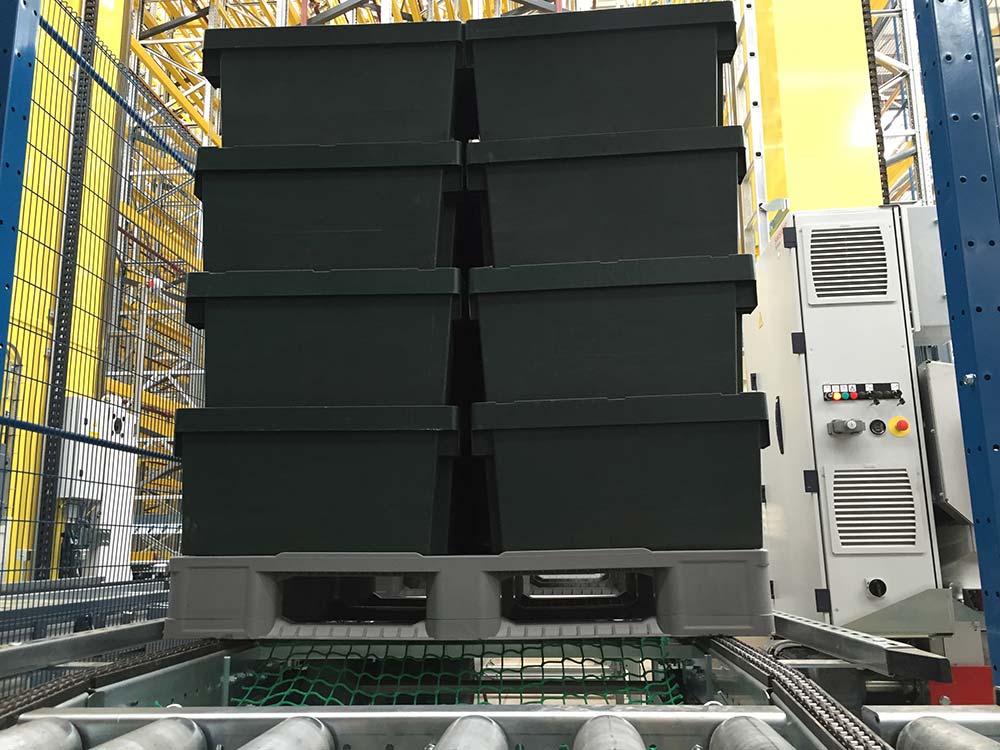Your cart is currently empty!
Serving the food industry for 20 years
As Goplasticpallets.com celebrates 20 years in business, MD Jim Hardisty takes a look at how far plastic pallets have come in the food industry and how they can help manufacturers achieve their sustainability goals.
I’ve always been a believer of looking forward, not back, but reaching a big milestone like this I’ve found myself reflecting on how far we’ve come as a business.
From humble beginnings with a team of just five, we’ve grown solidly over the last two decades – securing exclusive supplier agreements with some of Europe’s leading manufacturers to offer the largest, most diverse range of plastic pallets and boxes available in the UK. Our now 16-strong team boasts 155 years combined experience, but our ethos today remains the same as it was in 2001: to find the perfect match for every customer’s application.
Plastic pallets in the food industry
As an industry, we’ve seen considerable growth in demand for plastic pallets from food suppliers and manufacturers. Go back 20 years and there was limited use of plastic pallets in the food industry; food ingredients would be shipped on wooden pallets and then depalletized onto plastic pallets before entering the production area. A few suppliers might have used plastic pallets for deliveries, but back then, they were in the minority.
Yet overtime, we’ve seen more and more food manufacturers switching from wooden pallets to plastic for distribution, and a big driver behind this has been concerns over product contamination.
Ten years ago, the safety of wooden pallets for transporting food was called into question in the US when the National Consumers League (NCL) found wooden pallets tested positive for several foodborne pathogens. The NCL examined 140 wooden and plastic pallets stored behind grocery areas and revealed 33 percent of the wooden pallets showed signs of unsanitary conditions where bacteria could easily grow, 10 percent tested positive for E. coli, which can cause food poisoning, and 2.9 percent tested positive for the potentially deadly bug, Listeria.
Heightened awareness about the contamination risks of using wooden pallets for food distribution has driven a considerable shift towards plastic pallets; as a hygienic alternative they can be easily cleaned – therefore devoid of potential contaminants – and they can tolerate weak acids and alkalis.
Plastic pallets in automation
Hygiene aside, another factor that has driven more food manufacturers away from wooden pallets towards plastic is increased levels of automation. Five or six years ago we would have seen very low levels of automation in food production areas. Severe manufacturing and control regulations is considered one of the main reasons why uptake in automation has been much slower in the food industry in comparison to other sectors. However growing pressure from retailers in recent years to process and deliver ingredients faster than ever means that food manufacturers’ guarded attitude towards automation has had to change – and rapidly.
Today, intelligent robotics for instance is transforming processes, altering the way that employees work in food processing environments. Where humans were once an integral part of the assembly line, we’re seeing their roles shift towards ensuring the smooth operation of automated processes – leaving automated equipment to handle the monotonous, and sometimes dangerous tasks.
Plastic pallets and boxes perfectly complement automated handling systems as they are 100% size and strength consistent. Their durability is also unrivalled as they are moulded under extreme pressure to form a solid loading platform – free from nails of splinters that risk jamming and stalling automated systems.

Plastic pallets and sustainability
Another factor contributing towards the shift to plastic pallets is sustainability. This last year the pandemic has intensified pressure on the food industry to strive for greater resilience and sustainability. Consumers are increasingly looking for brands and manufacturers that genuinely consider the environment in their operations and take actions for positive change.
According to a recent global analysis by Edelman Data & Intelligence looking at the environmental sustainability commitments of the food, beverage and agricultural sectors many consumers place a high value on sustainability. The analysis found that consumers recognise significant value in products that support sustainability initiatives, reportedly tolerating up to a 36 percent increase in the optimal price point over standard goods.
Reducing packaging and ensuring it is recyclable has been a key focus for many food manufacturers in their mission to achieve sustainability goals. But creating a truly sustainable supply chain requires a business to evaluate their entire operations, including the pallets they use.
Plastic pallets for example can last up to 15 years without repair in some supply chains, and at the end of their life, they can be ground down and the plastic reused to create the next generation of plastic pallets. Their long-life and recyclability makes them a valuable asset, one that can contribute to creating a circular economy.
As Goplasticpallets.com we are proud that more than 96% of the plastic pallets we supply are made entirely from recycled plastic. We also uphold a very strong environmental policy; taking responsibility for the plastic pallets and boxes we supply is very important to us. It’s the reason why we decided to launch our recycling scheme in 2019 and why we extended our promise last year to recycle all customers’ unused plastic pallets and boxes, regardless of who supplied them.
For expert advice on using plastic pallets for your application call the team on 01323 744057 or email sales@goplasticpallets.com
